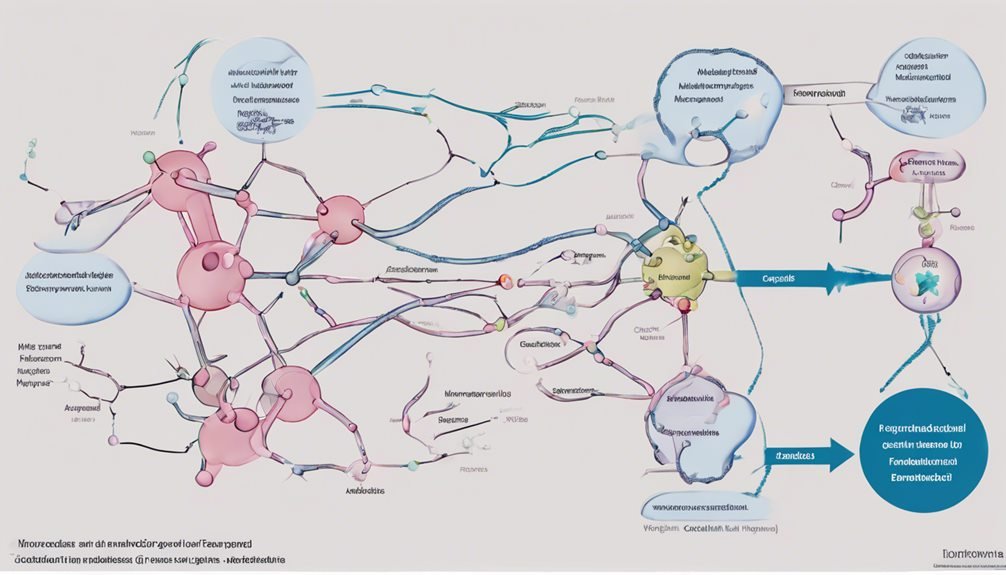When exploring alternative cancer treatments, considering Mebendazole as a component of a comprehensive protocol can offer a fresh perspective on battling this complex disease. Its potential impact on cancer cells and emerging research findings present intriguing possibilities for augmenting traditional therapeutic strategies. By understanding how Mebendazole interacts with cancer pathways and its effects on tumor growth, you may uncover a compelling option worth exploring further in the realm of personalized cancer care.
Key Takeaways
- Mebendazole offers unique cellular targeting in cancer treatment.
- Demonstrates antiangiogenic effects and disrupts cancer cell microtubules.
- Enhances traditional chemotherapy regimens with multiple mechanisms.
- Well-tolerated with minimal side effects, validated in clinical studies.
- Potential for personalized medicine and improved outcomes across diverse cancers.
Mebendazole's Mechanism of Action
Mebendazole operates as a potent antiparasitic medication commonly used to treat various worm infections. When considering its mechanism of action beyond parasitic treatment, mebendazole has shown promising effects in cancer treatment due to its unique cellular targeting abilities and antiangiogenic effects.
In terms of cellular targeting, mebendazole has been found to disrupt microtubule function in cancer cells, leading to cell cycle arrest and ultimately inducing cell death. By specifically affecting cancer cells, mebendazole demonstrates a targeted approach that minimizes harm to healthy cells, a crucial aspect in cancer treatment.
Moreover, mebendazole exhibits antiangiogenic effects, meaning it can inhibit the formation of new blood vessels that tumors rely on for growth and metastasis. By cutting off the tumor's blood supply, mebendazole hinders its ability to thrive and spread throughout the body.
Understanding mebendazole's cellular targeting and antiangiogenic effects provides insight into its potential as part of alternative cancer protocols, offering a new perspective on its therapeutic applications beyond its traditional use as an antiparasitic medication.
Historical Use in Parasitic Infections
With a rich history dating back several decades, the use of mebendazole in parasitic infections has been extensively documented and studied. Mebendazole, originally introduced in the 1970s, has been a staple in treating various parasitic infections globally. Here are some key insights into its historical use:
- Effective Treatment: Mebendazole has shown significant efficacy in treating a wide range of parasitic infections, including roundworms, hookworms, and whipworms. Its ability to disrupt the parasites' microtubule structure leads to their immobilization and eventual death.
- Low Side Effects: Historically, mebendazole has been well-tolerated with minimal adverse effects reported. This has made it a preferred choice in treating parasitic infections, especially in children and pregnant women.
- Global Impact: Mebendazole's affordability and effectiveness have made it a crucial component in global health initiatives aimed at eradicating parasitic infections in resource-limited settings. Its widespread availability has helped combat the burden of parasitic diseases in vulnerable populations worldwide.
Repurposing for Cancer Treatment

Having demonstrated efficacy in treating parasitic infections for decades, mebendazole is now being investigated for its potential in cancer treatment. When it comes to repurposing for cancer treatment, researchers are exploring the use of mebendazole in combination therapies to enhance its effectiveness.
Studies have shown that mebendazole, in combination with other cancer treatments, can lead to improved treatment outcomes for patients.
Combination therapies involving mebendazole have the potential to target cancer cells through multiple mechanisms, increasing the chances of successful treatment. By utilizing mebendazole alongside traditional cancer treatments such as chemotherapy or targeted therapies, researchers aim to enhance the overall efficacy of cancer treatment regimens.
Treatment outcomes in cancer patients receiving mebendazole in combination therapies have shown promising results in terms of tumor response rates and overall survival. This approach offers a new perspective on cancer treatment, highlighting the potential benefits of repurposing existing medications like mebendazole to improve patient outcomes in the fight against cancer.
Anticancer Properties Uncovered
Unveiling its hidden potential, recent research has shed light on the anticancer properties of mebendazole. This commonly used anthelmintic drug has shown promise in the realm of cancer treatment, demonstrating potent effects beyond its original intended use.
Key Insights:
- Mechanistic Insights:
- Mebendazole has been found to exhibit anticancer activity through multiple mechanisms, including disrupting microtubule function, inducing apoptosis in cancer cells, and inhibiting angiogenesis.
- Preclinical Evidence:
- Preclinical studies have provided compelling evidence of mebendazole's ability to inhibit tumor growth, reduce metastasis, and enhance the effectiveness of chemotherapy in various types of cancer.
- Therapeutic Potential:
- The growing body of research suggesting the anticancer properties of mebendazole highlights its potential as an adjunctive therapeutic agent in cancer treatment protocols, offering a novel approach to combating cancer's progression.
Clinical Studies and Findings

Recent advancements in the exploration of mebendazole's anticancer potential have paved the way for clinical studies aimed at validating its efficacy in cancer treatment. These studies have shown promising results in terms of survival rates among cancer patients. Research has indicated that mebendazole, traditionally used as an anthelmintic drug, exhibits significant antitumor activity by targeting microtubule function in cancer cells.
Clinical findings have highlighted the potential of mebendazole to enhance survival rates in various types of cancer, including glioblastoma, colon cancer, and breast cancer. Patients treated with mebendazole in conjunction with standard cancer therapies have shown improved outcomes compared to those receiving conventional treatment alone.
Moreover, studies have reported minimal adverse reactions associated with mebendazole use, making it a well-tolerated option for cancer patients. The low incidence of adverse effects further supports the safety profile of mebendazole as part of an alternative cancer protocol.
Synergistic Effects With Other Therapies
How do different cancer therapies interact with mebendazole to create synergistic effects in cancer treatment? When mebendazole is combined with other treatment modalities, it can lead to enhanced outcomes due to synergistic effects. Here are three ways in which mebendazole can complement other therapies in cancer treatment:
- Combination Therapies: Mebendazole has shown promise in combination with traditional chemotherapy drugs, enhancing their efficacy. Studies have demonstrated that mebendazole can sensitize cancer cells to chemotherapy, potentially reducing the required dosage of chemotherapeutic agents while maintaining or even improving treatment outcomes.
- Immunotherapy Integration: Mebendazole's immunomodulatory properties make it a promising candidate for combination with immunotherapy. By enhancing the immune response against cancer cells, mebendazole can potentially amplify the effects of immunotherapeutic agents, leading to a more robust anti-cancer response.
- Targeted Therapy Regimens: Mebendazole has also been investigated in combination with targeted therapies. The synergistic effects observed when mebendazole is combined with targeted agents suggest a potential for more precise and effective treatment regimens tailored to individual patients' needs.
Safety and Side Effect Profile

Moving from the discussion on synergistic effects with other therapies, it's important to now shift focus towards examining the safety and side effect profile of mebendazole in cancer treatment.
When considering the long-term safety and efficacy of mebendazole, studies have shown promising results with minimal adverse effects. Mebendazole is generally well-tolerated, with the most common side effects including mild gastrointestinal symptoms such as nausea, diarrhea, and abdominal pain. These side effects are usually transient and resolve with continued treatment or dose adjustment.
Studies have demonstrated the safety of mebendazole even at higher doses than traditionally used for anti-parasitic purposes. Additionally, its mechanism of action targets cancer cells specifically, minimizing the impact on healthy cells and reducing the likelihood of severe side effects.
Potential Applications in Different Cancers
Studies have consistently highlighted the potential applications of mebendazole in various types of cancers, showcasing its versatility as a therapeutic agent in oncology. When considering its role in cancer treatment, the following points are worth noting:
- Combination Therapies: Mebendazole has shown promise when used in combination with traditional chemotherapy drugs, enhancing their effectiveness against certain cancers. The synergistic effects observed in preclinical studies suggest a potential for improved outcomes when mebendazole is incorporated into existing treatment regimens.
- Personalized Medicine: With the rise of personalized medicine, mebendazole presents an exciting opportunity for tailored cancer treatments. Its ability to target specific pathways involved in cancer growth makes it a valuable addition to the arsenal of precision medicine, allowing for more targeted and effective therapies based on individual patient characteristics.
- Diverse Cancer Types: Mebendazole has demonstrated efficacy across a range of cancer types, including but not limited to breast, prostate, lung, and colon cancers. Its broad-spectrum activity against various malignancies underscores its potential as a versatile agent in the fight against cancer.
Patient Experiences and Testimonials

Patient Experiences and Testimonials shed light on the real-world impact of incorporating mebendazole into cancer treatment regimens. Patient testimonials highlight real-life experiences and offer valuable insights into the benefits of using mebendazole as part of an alternative cancer protocol.
Many patients have reported improvements in their quality of life, tumor shrinkage, and increased energy levels after integrating mebendazole into their treatment plan. These firsthand accounts provide compelling evidence of the potential efficacy of mebendazole in combating cancer.
Patients have expressed gratitude for the additional option mebendazole provides, especially for those seeking alternative approaches or facing limited treatment choices. Some have shared stories of reduced side effects compared to traditional treatments, along with a sense of empowerment in taking a proactive role in their healing journey.
Dosage and Administration Guidelines
For optimal efficacy and safety when incorporating mebendazole into a cancer treatment regimen, precise dosage and administration guidelines are crucial. When considering the use of mebendazole as part of an alternative cancer protocol, it's essential to follow these guidelines:
- Treatment Duration: The duration of mebendazole treatment can vary depending on the specific type and stage of cancer. Typically, treatment courses range from several weeks to several months. It's important to consult with a healthcare provider to determine the appropriate duration for your individual case.
- Dosage: The standard dosage of mebendazole for cancer treatment is around 100-200mg taken orally, one to three times daily. Dosages may vary based on factors such as body weight and the specific type of cancer being targeted.
- Monitoring Response: Regular monitoring of your response to mebendazole treatment is crucial. This may involve imaging tests, blood work, or other diagnostic measures to assess the effectiveness of the treatment and make any necessary adjustments.
Future Research Directions

To pave the way for advancements in the field of utilizing mebendazole as part of alternative cancer protocols, future research endeavors should focus on exploring the synergistic effects of mebendazole in combination with other anticancer agents. Combination therapies have shown promise in enhancing treatment outcomes by targeting cancer through multiple pathways simultaneously. Investigating the interactions between mebendazole and existing chemotherapy drugs or novel targeted therapies could lead to more effective and personalized treatment strategies for cancer patients.
Moreover, targeted delivery mechanisms for mebendazole could enhance its efficacy while minimizing potential side effects. Research in this area should explore innovative drug delivery systems such as nanoparticles, liposomes, or prodrug formulations to improve the bioavailability and tumor-specific accumulation of mebendazole.
Integrating Mebendazole Into Treatment Plans
Consideration should be given to the strategic integration of mebendazole into existing cancer treatment plans. When incorporating mebendazole into treatment strategies, it's essential to focus on treatment combinations and efficacy outcomes to maximize its potential benefits.
Key Points for Integrating Mebendazole:
- Synergistic Combinations: Explore potential synergies between mebendazole and other conventional or complementary therapies to enhance treatment efficacy. Research suggests that combining mebendazole with certain chemotherapy agents or immunotherapies may lead to improved outcomes by targeting cancer cells through multiple mechanisms.
- Monitoring Efficacy Outcomes: Regularly assess the efficacy of mebendazole within the treatment plan through clinical evaluations, imaging studies, and biomarker analysis. Tracking specific efficacy outcomes such as tumor size reduction, progression-free survival, and overall response rates can provide valuable insights into the impact of mebendazole on cancer progression.
- Individualized Treatment Plans: Tailor treatment plans to individual patient needs by considering factors like cancer type, stage, and overall health status. Personalizing the integration of mebendazole based on these variables can optimize treatment effectiveness and minimize potential side effects.
Frequently Asked Questions
Can Mebendazole Be Used in Combination With Chemotherapy?
Yes, mebendazole's efficacy has shown promise in combination with chemotherapy. Studies suggest that this combination can enhance the treatment outcomes for certain types of cancer. By utilizing mebendazole alongside traditional chemotherapy, there's a potential for improved efficacy in targeting cancer cells.
This approach may offer a more comprehensive treatment strategy, potentially leading to better patient outcomes. Consult with healthcare professionals to determine the best course of action for your specific situation.
Are There Any Dietary Restrictions While Taking Mebendazole?
When taking Mebendazole, it's crucial to focus on nutritional considerations and lifestyle habits. While there are no specific dietary restrictions, it's recommended to maintain a balanced diet rich in fruits, vegetables, and whole grains to support overall health.
Avoiding excessive alcohol and smoking can also enhance the efficacy of Mebendazole. Prioritizing a healthy lifestyle can complement the effects of Mebendazole in supporting your well-being during treatment.
Does Mebendazole Interact With Other Medications?
When taking mebendazole, it's essential to consider potential interactions with other medications. Mebendazole can affect liver enzymes, potentially altering how other drugs work in your body. Always consult your healthcare provider before starting mebendazole to ensure safe use.
Dosage adjustments may be necessary if you're taking medications that could interact with mebendazole. Monitoring for side effects and discussing any concerns with your healthcare team is crucial for your well-being.
Is Mebendazole Safe for Pregnant or Breastfeeding Women?
When it comes to safety considerations for pregnant or breastfeeding women, using mebendazole may not be the best choice. Usage guidelines suggest avoiding this medication during pregnancy and while breastfeeding.
It's crucial to prioritize the health of both you and your baby. Always consult your healthcare provider before taking any medications, especially during these sensitive times.
Your well-being and that of your little one are of utmost importance.
How Long Does It Take to See Results With Mebendazole in Cancer Treatment?
You may start seeing improvements within weeks of starting mebendazole treatment for cancer. The treatment timeline can vary depending on individual factors, but some patients report positive outcomes such as tumor shrinkage or symptom relief in as little as a month.
It's important to monitor patient outcomes closely and consult with healthcare providers for personalized guidance on the effectiveness of mebendazole in cancer treatment.
Conclusion
As you embark on your cancer treatment journey, envision Mebendazole as a beacon of hope illuminating the path towards healing. Like a skilled archer aiming for the bullseye, Mebendazole targets cancer cells with precision and determination. Trust in its proven antiparasitic properties and emerging anticancer mechanisms to guide you towards improved survival rates and enhanced treatment outcomes. Embrace Mebendazole as a vital ally in your personalized cancer treatment plan, paving the way for a brighter, healthier future.





